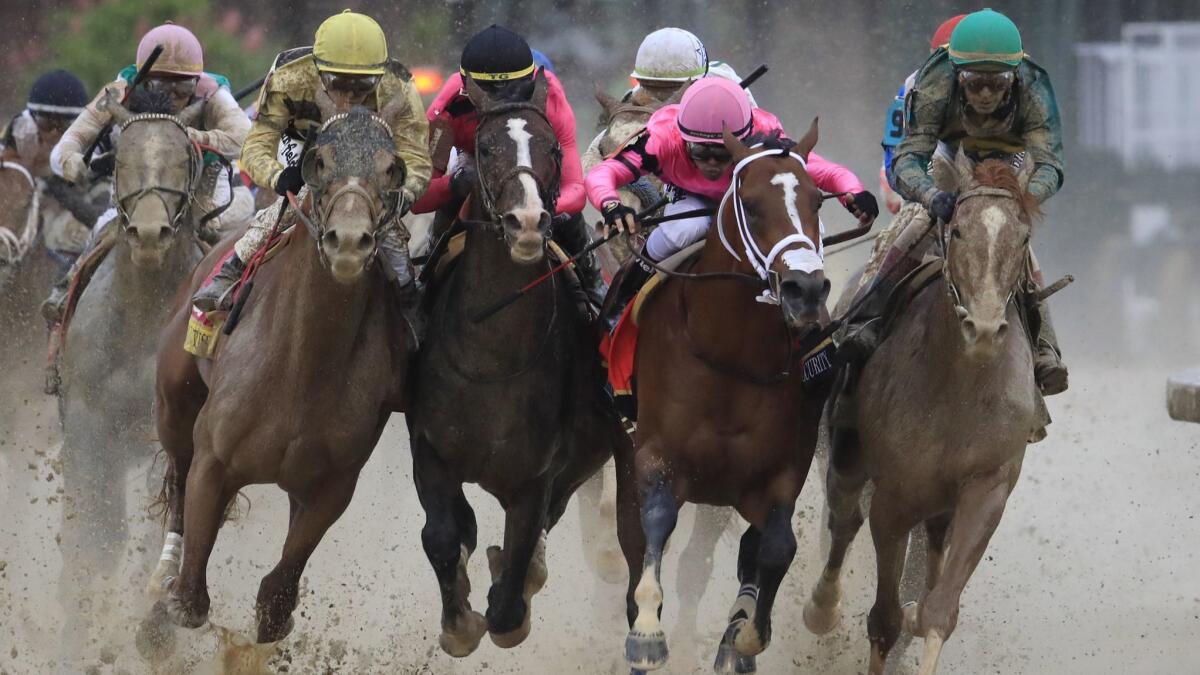Kentucky Derby derby appeal by Maximum Security owner is denied

- Share via
Gary West, the owner of disqualified Kentucky Derby horse Maximum Security, upped the ante on the post-race rhetoric Monday by calling Churchill Downs “greedy” and saying he would appeal the decision — only to find out later that appeals are not allowed.
Appearing on NBC’s “Today” show, West challenged the standard 20-horse Kentucky Derby field, saying it was risky to horses and jockeys, then declared Maximum Security out of the Preakness.
“There is no Triple Crown on the line for us,” West said, “and there is no reason to run a horse back in two weeks when you don’t have to.”
The appeal he filed with the Kentucky Horse Racing Commission was denied because disqualifications are exempt from the appeal process.
“The stewards unanimously disqualified Maximum Security following two objections lodged immediately after the 145th running of the Kentucky Derby and after a thorough review of a race replay,” said John L. Forgy, general counsel of the Kentucky Horse Racing Commission, in a letter to Maximum Security’s connections. “That determination is not subject to an appeal.”
On Saturday, Churchill Downs stewards disqualified the winner for interference for the first time in the race’s 145-year history. Country House, who had crossed the line second, was declared the winner. The decision has been the subject of national debate that has included President Trump, who said it was a byproduct of political correctness.
Many trainers strongly agree with the decision that when Maximum Security drifted from the inside to a path about three wide, he put horses and jockeys in danger. But it’s a difficult concept to explain to the general public when it’s not obvious watching in real time.
In the interview on NBC, speaking well before daybreak from his Rancho Santa Fe, Calif., home, West took strong issue with the decision and the racetrack.
“It was literally like the old TV show [“Wide World of Sports”]: the thrill of victory and the agony of defeat all within a 22-minute period of time,” West said. “Winning it was probably the most euphoric thing [my wife] Mary and I have ever had in our lives, and then disappointment when they took him down for the first time in history. We were stunned, shocked and in total disbelief.”
West’s strongest words were directed at Churchill Downs. The Kentucky Derby is the only major U.S. race that allows 20 starters. (Because of a scratch, there were 19 on Saturday.) Most major races in the nation are capped at 14 starters, either because of the width of the track or for the manageability of the race.
“Churchill Downs, because they are a greedy organization, [doesn’t run] 14 [in the Kentucky Derby] like you have in the Kentucky Oaks, Breeders’ Cup and just about every other race in America,” West said. “Just because they can make more money, they are willing to risk horses’ lives and peoples’ lives to do that. I’m not a fan of that. I think they ought to have 14 like every other race.”
Only one horse has ever died as a result of running in the Kentucky Derby — Eight Belles in 2008.
Sign up for our horse racing newsletter »
“We understand that the Wests are disappointed that the Kentucky Horse Racing Commission stewards disqualified Maximum Security,” said Kevin Flanery, president of Churchill Downs. “However, the stewards are responsible for regulating and enforcing the rules of racing in the Commonwealth of Kentucky and we respect and support their decision. The infraction committed by Maximum Security has nothing to do with the number of horses in the race, which has been a consistent number for many years, and there is no evidence to the contrary.”
West could seek civil litigation, although that would be a long process.
“There are so many questions,” said Darrell Vienna, a former trainer who is an attorney specializing in equine law. “Was the horse clear? Did the horse swerve? The real issue is, did it alter the finish? How do you argue against the discretion of the stewards? For the amount of money at stake, it’s an interesting case.”
West’s strong words came as a surprise to many people in the horse racing industry given his reputation as a quiet gentleman who leaves most of the decisions up to his racing managers. The 73-year-old is a philanthropist who spends most of his money fighting what he believes to be a corrupt healthcare system. He made his money by starting a technology-based call-center business, which he sold for more than $1 billion.
More to Read
Go beyond the scoreboard
Get the latest on L.A.'s teams in the daily Sports Report newsletter.
You may occasionally receive promotional content from the Los Angeles Times.











